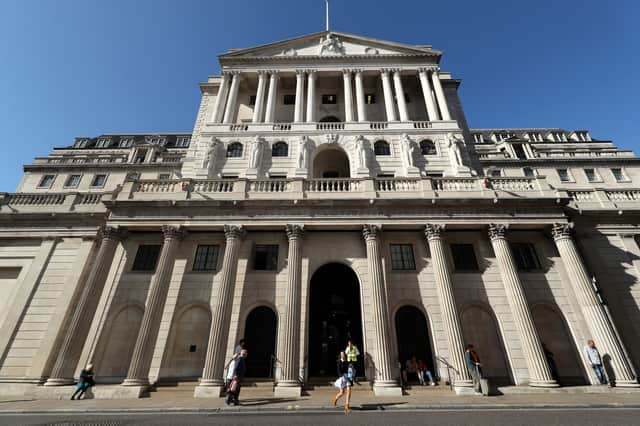Bank raises interest rates to 0.25% to help rein in rocketing inflation - here’s everything you need to know
This article contains affiliate links. We may earn a small commission on items purchased through this article, but that does not affect our editorial judgement.


Interest rates have been raised by the Bank of England after UK inflation reached the highest peak in a decade.
The Bank has set the new interest rates at 0.25%, with warnings from bosses that inflation could rise even higher next year.
Advertisement
Hide AdAdvertisement
Hide AdBut what does the new interest rates mean and will the cost of living increase over the coming months?
Why have the interest rates been raised?
Members of the Monetary Policy Committee (MPC) voted eight to one to raise the interest rates to 0.25%.
The rates were raised from 0.1%, which was a historic low, to combat the rapid increase in the cost of living within the UK.
Alongside this, the Bank also noted fears over the impact the Omicron Covid-19 wave currently rising in the UK will have on the economy, which is healing after a tough period of lockdown.
Advertisement
Hide AdAdvertisement
Hide AdIt has already been noted that Omicron has slowed the growth of the economy.
The Bank said: “Most members of the committee judged that an immediate, small increase in Bank rate was warranted.”
They added that there was “some value in waiting for further information on the degree to which Omicron was likely to escape the protection of current vaccines and on the initial economic effects of this new wave”.
“There was, however, also a strong case for tightening monetary policy now.”
Advertisement
Hide AdAdvertisement
Hide AdIt marks the first time interest rates have been raised since August 2018 and the move marks the first major central bank to raise rates since the start of the Cornavirus pandemic.
What is the current rate of inflation?
Earlier this week, the Consumer Prices Index showed that inflation had soared to 5.1%, marking the highest level for the past decade.
With warnings that this is set to increase even further in the new year, the British public may expects to see a further increase in the cost of living in 2022.
The Bank of England has warned that inflation could peak at 6% in April 2022, which would be the highest level since March 199 and three times the 2% target.
Advertisement
Hide AdAdvertisement
Hide AdAlpesh Paleja, lead economist at the CBI business group, said: “The decision to raise interest rates signals that the MPC wants to get off on the front foot in tackling rising inflation.”
Economist Samuel Tombs said that the move to raise the interests rates “underlines how worried it is about the outlook for inflation”, but urged the Bank to wait until May 2022 to raise the rates again to 0.5%.
A message from the editor:
Thank you for reading. NationalWorld is a new national news brand, produced by a team of journalists, editors, video producers and designers who live and work across the UK. Find out more about who’s who in the team, and our editorial values. We want to start a community among our readers, so please follow us on Facebook, Twitter and Instagram, and keep the conversation going. You can also sign up to our email newsletters and get a curated selection of our best reads to your inbox every day.
Comment Guidelines
National World encourages reader discussion on our stories. User feedback, insights and back-and-forth exchanges add a rich layer of context to reporting. Please review our Community Guidelines before commenting.
